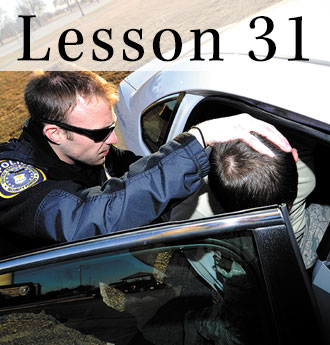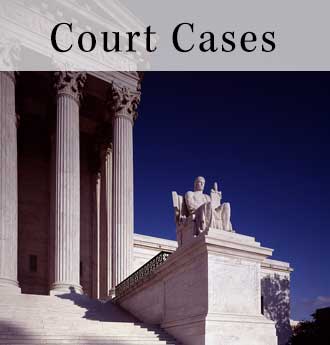Lesson 31: How Do the Fourth and Fifth Amendments Protect against Unreasonable Law Enforcement Procedures?
What is the history of the Fourth Amendment? (Video)
English common law and the Fourth Amendment; warrants and general warrants; Parliament and general warrants in the American colonies; treatment of warrants in the Bill of Rights and state constitutions; requirement of probable cause; issue of limits on governmental power.
Student Questions: Unit 5, Lesson 31, Sections 1-7 (pdf download)
What are contemporary concerns about privacy and the Fourth Amendment? (Video)
Privacy and the Fourth Amendment; reasonable expectation of privacy; privacy issues involving social media and private employers.
When is a warrant required, and what is probable cause? (Video)
When warrants are required and the meaning of "probable cause"; meaning of "exigent circumstances"; stop-and-frisk issues; issue of limitations on government in regard to privacy and personal security.
What is the exclusionary rule, and what are its purposes? (Video)
Purpose and function of the exclusionary rule; Fourth Amendment; advantages and disadvantages of alternatives to the exclusionary rule; current tendencies of the Supreme Court in dealing with Fourth Amendment issues; circumstances when warrants might not be required; Fifth Amendment and the privilege against self-incrimination; current practice regarding Fifth Amendment issues; waterboarding and the Fifth Amendment.
What are the purposes of the privilege against self-incrimination? (Video)
Purpose and function of the privilege against self-incrimination; burden of proof; situations in which the privilege against self-incrimination is applicable; relationship of the privilege against self-incrimination to the rule of law.
What is the Miranda Rule and what are its purposes? (Video)
The Miranda Rule and its purposes and functions; waivers of rights; Dickerson v. United States (2000).
How does immunity work? When can law enforcement take breath and blood samples? (Video)
Purpose and functions of grants of immunity; issue of breathalyzers and blood draws and their possible conflict with Fourth and Fifth Amendment rights.
Reasonable Expectations of Privacy (Video)
A video about the reasonable expectation of privacy under the Fourth Amendment.
Fourth Amendment Warrant Requirement (Video)
A video discussing what a search warrant is, how they are obtained, and for what reasons they are obtained.
Exceptions to Warrant Requirement (Video)
An explanation of the exceptions to search warrants under the Fourth Amendment.
Probable Cause (Video)
A brief video about probable cause and its importance.
Mapp v Ohio and The Exclusionary Rule (Video)
A video about the exclusionary rule. Discusses the famous Mapp v. Ohio case that led to the creation of the exclusionary rule.
Andy Griffith on the Fourth Amendment (Video)
In this segment from the Andy Griffith Show, Sheriff Andy Taylor explains a key element of the Fourth Amendment to his son, Opie.
Peter Segal: The Right to Privacy (Video)
Private Investigator Efrat Cohen explains to Peter Sagal why there really isn't any privacy anymore and what the government is legally allowed to do with information you publish online.
The Hollywood Blacklist: 1947-1960 (Video)
This documentary provides a brief overview of the House Un-American Activities Committee.
Landmark Supreme Court Cases: New Jersey v. TLO (Video)
Landmark Supreme Court Cases
Miranda and the 5th Amendment (Audio)
An explanation of the Miranda rule and the Fifth Amendment. From the Federal Law Enforcement Training Center of the Department of Homeland Security. Size: 6.2 mb. Length: 13 min., 36 sec.
Miranda Waivers and Invocation (Audio)
An explanation of Miranda waivers and invocation. From the Federal Law Enforcement Training Center of the Department of Homeland Security. 6.5 mb. Length: 13 min., 52 sec.








